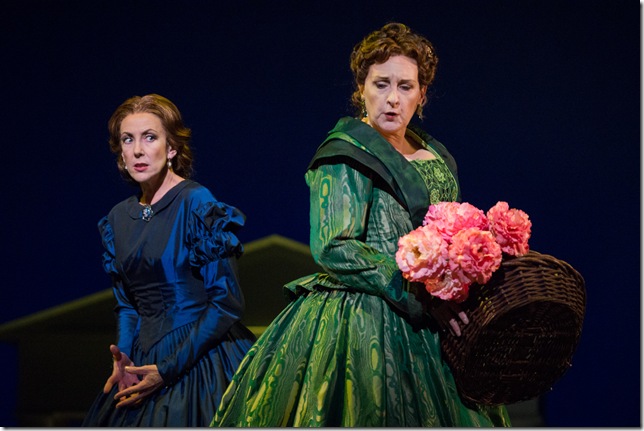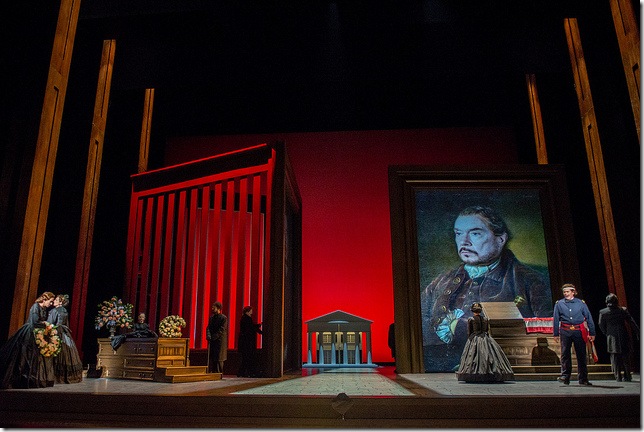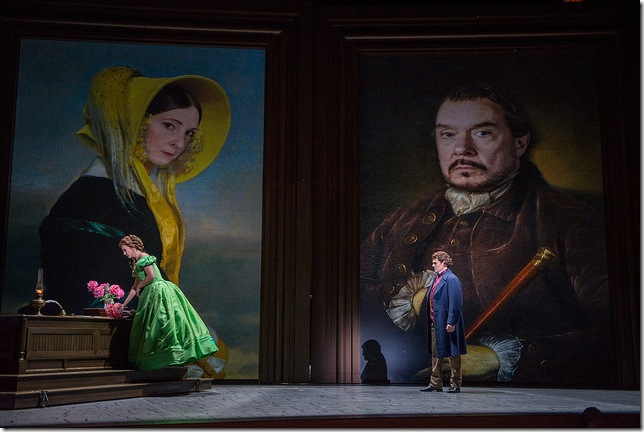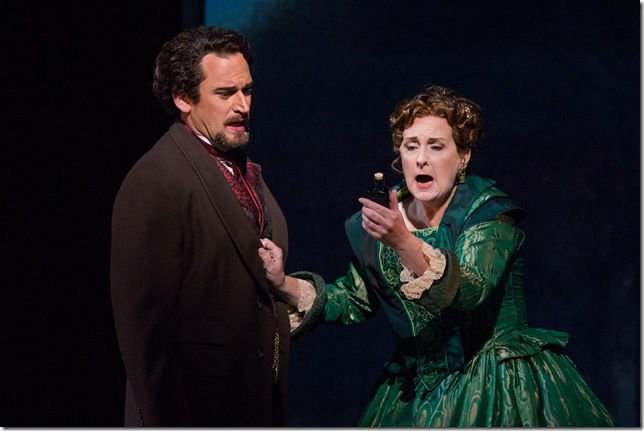Marvin David Levy’s opera Mourning Becomes Electra made a big impression when it was first launched at the Metropolitan Opera in 1967, helped by the star turns of its leading ladies, Evelyn Lear and Marie Collier, and a young baritone named Sherrill Milnes.
It had to wait 30 years for its next performance, at Chicago’s Lyric Opera, and its current production at Florida Grand Opera was preceded by only two others, in Seattle (2003) and New York (2004). That is unfortunate, because its presentation Nov. 9 at the Broward Center in Fort Lauderdale showed it to be an opera of considerable emotional power, with a score of great skill and intense atmosphere that effectively evokes the rotting hothouse milieu of the Mannon family, the Civil War stand-ins for the original Greek characters of Aeschylus on whom Eugene O’Neill based the 1931 stage play that Levy and librettist Henry Butler used for the opera.
Although the score lacks a strong melodic profile that the drama seems to cry out for at key moments, perhaps only the demands of the two female roles otherwise explains the opera’s relative neglect; many a contemporary score without Levy’s orchestral inventiveness and sure understanding of dramatic situation have come and gone with considerably more acclaim.
Much praise, therefore, to FGO’s new executive director, Susan Danis, for having the courage to open the company’s 73rd season with this work, which required two leaps of faith: One in the willingness of her audience to show up in good numbers for something that wasn’t Italian and Romantic, and a second in the ability of Levy’s work to involve them. Her confidence in both has paid off in an evening that FGO can be proud of, and which other opera companies would do well to consider for their mainstage offerings.
Danis has been considerably helped by the production itself, which is brilliant. Stage director Kevin Newbury (whose Roméo et Juliette for Palm Beach Opera was fresh and inventive) and the young American set designer Anya Klepikov, making her debut here with FGO, have fashioned an ingenious, evocative set in which two mid-19th-century-style portraits of the Mannons stare at the audience from two oversized frames. The portraits change along with the action, and then turn into showcases in which the ghosts of the opera’s dead can be seen walking into the infinite or reaching their arms out and pleading with the viewer, effects beautifully realized by projection designer Wendall Harrington.
The other major set element is two large scrims with vertical panels that rotate to show an interior or to function as giant blinds; their effect is especially keenly felt in the final moments, when Lavinia is fighting to move on from the family curse. Newbury and Klepikov also have used a dollhouse version of the Mannon house on stage that gets closed or opened depending on the action of the opera, and it adds a strong but subtle underlining to the drama.
Klepikov’s set also is spare, with a desk standing in for a ship’s cabin and action down below taking place off to the side rather than in a different enclosed space. But it all works, and while an entire set and stage design so steeped in metaphor threatens to be heavy-handed, it does not come off that way here because of the taste and restraint with which they are used, and as sensitively lit as they are by Robert Wierzel. It is rare to find a production design that plays so important a part in the proceedings, but this design is nothing less than the Greek chorus of the drama, mute, but in its colors, images, starkness and delicate application, surpassingly eloquent.
The production works so well also because Levy’s opera is an eight-person chamber work, intimate rather than grand, an opera of inner states even when shocking violence intrudes. Soprano Lauren Flanigan, who has championed this role at the Seattle and New York City operas, was excellent as Christine, the conflicted, adulterous matriarch who sets the whole tragedy in motion. Her voice is strong and clear, with impressive stamina in a role that requires a lot of high notes over a large orchestra going full out.
Although Christine is not an admirable character, Flanigan gives us all her sides, and manages even to evoke sympathy in her scenes with her illicit lover, Adam Brant, son of her husband’s brother and a maid. She comes off as a woman buffeted and trapped by family obligation and emotional turmoil, and Flanigan inhabits the role completely, making her unforgettable.
The Canadian soprano Rayanne Dupuis, in the pivotal role of Lavinia, Christine’s daughter, is an admirable actress whose range is wide, and who takes center stage easily after Christine has killed herself. Her singing is accomplished and masterful, especially in handling the occasional melismatic settings Levy gives to the text. But while her voice is pretty and flexible, it also is light, and on Nov. 9 it grew underpowered as the night went on; there was a considerable difference in sheer volume between Dupuis’s singing and the always muscular sound of Flanigan.
In the male roles, baritone Morgan Smith, as Adam Brant, offered a creamy voice that sounded youthful and passionate, well-suited for this role (local audiences may have seen him recently in the televised PBS production of Jake Heggie’s Moby-Dick from San Francisco Opera, in which he made a fine Starbuck). In his Too weak to kill the man I hate, which in this production opened Act II, and in You gave the gift of love, the tenor-like qualities of his instrument were most appealing.
As Ezra Mannon, the doomed general betrayed by a cheating wife, bass Kevin Langan, an FGO veteran, was impressive in his short time on stage, with a large, commanding voice that seized the attention. He was also persuasive in his acting, which required him to die onstage from poison in a believable way.
Baritone Keith Phares, who played Orin Mannon, the tortured brother and mama’s boy, also was excellent, with a beautiful, rich voice and an effective stage manner in which the tempestuousness of his character was expertly communicated.
Two Young Artists troupe members, baritone Thomas Lehman and soprano Riley Svatos, sang siblings Peter and Helen Niles, respectively. Lehman made the stronger impression, in part because he has more to do; he made good use of his pleasant, well-rounded voice. Svatos has a light, delicate sound that got a little lost amid all the other goings-on, but it would be good to hear her again in a less massive orchestral environment. Baritone Nelson Martinez, as Jed, had only a couple lines, but the voice is bass-like and distinctive, which bodes well for his appearance as Nabucco in FGO’s next production.
 The Florida Grand Opera Orchestra sounded splendid throughout this very difficult score, and conductor Ramon Tebar kept it from overpowering his singers. He also overstressed the soft, mysterious cast of much of the score, almost fetishizing it, which gave the music rather more bloodless an effect than it might otherwise have had.
The Florida Grand Opera Orchestra sounded splendid throughout this very difficult score, and conductor Ramon Tebar kept it from overpowering his singers. He also overstressed the soft, mysterious cast of much of the score, almost fetishizing it, which gave the music rather more bloodless an effect than it might otherwise have had.
As I mentioned, many a contemporary score of far less merit than this one have been prominent of late, but Levy’s score needs more light in the times when the drama allows it; for instance, when Lavinia accepts Peter’s marriage proposal, which seems to beg for a different kind of texture and melody to mirror the character’s experience. There are several of these moments in the opera, where a stronger melodic impulse and a new harmonic and rhythmic framework would provide much-needed contrast with the generally dark color of the music, and also give the overall drama more shape. After all, there are some moments in this downbeat night that are happy, and they need to be brought out.
Nonetheless, this is an important production that opera lovers shouldn’t miss. The cast gives it everything they have, and they are featured in a marvelous stage presentation (you’ll be hearing more about Newbury and Klepikov). Best of all, this is an opera by a living American composer, using a text by a major American playwright, and should be on the list of operas American companies should add to their repertory.
At the Nov. 9 performance, the composer, now 81 and wheelchair-bound, was brought onto the stage to warm and enthusiastic applause from the house, and from the cast on stage. It is a pity that Levy has not had more productions of his opera, but judging by the smile on his face as he was wheeled closer to the audience, it was a big night for him, and worth the wait.
MOURNING BECOMES ELECTRA will be performed at 7 p.m. Saturday, 2 p.m. Sunday, and at 8 p.m. Nov. 19 and 23, in the Ziff Ballet Opera House at the Adrienne Arsht Center for the Performing Arts in Miami. Call 1-800-741-1010 or visit www.fgo.org for tickets.



